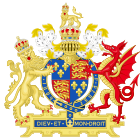Act of Uniformity 1549

|
|
| Long title | An Acte for the unyformytie of Service and Admynistracion of the Sacramentes throughout the Realme. |
|---|---|
| Citation | 2 & 3 Edw 6 c 1 |
|
Status: Repealed
|
|
The Act of Uniformity 1548 (2 & 3 Edw 6 c 1), also referred to as the Act of Uniformity 1549, was an Act of the Parliament of England, passed on 21 January 1549.
It was the logical successor of the Edwardian Injunctions of 1547 and the Sacrament Act of the same year which had taken piecemeal steps towards the official introduction of Protestant doctrine and practice into England and Wales. It established The Book of Common Prayer (The Book of the Common Prayer and Administration of the Sacraments, and other rites and ceremonies of the Church after the use of the Church of England) as the sole legal form of worship in England. Before 1549, the churches of England used various different versions of the Latin-language Missal.
The Book of Common Prayer was far from just an English-language translation of the Latin liturgical books; it was largely a new creation, mainly the work of Archbishop Thomas Cranmer, which in its text and its ceremonial directions reflected various reforming doctrinal influences (notably the breviary of Cardinal Quiñonez and the Consultation of Hermann von Wied). The first Act (2 & 3 Edw 6 c 1) was called An Act for Uniformity of Service and Administration of the Sacraments throughout the Realm. It deemed as follows:
and that all and singular ministers in any cathedral or parish church or other place within this realm of England, Wales, Calais, and the marches of the same, or other the king's dominions, shall, from and after the feast of Pentecost next coming, be bound to say and use the Matins, Evensong, celebration of the Lord's Supper, commonly called the Mass, and administration of each of the sacraments, and all their common and open prayer, in such order and form as is mentioned in the said book, and none other or otherwise
This section covers the following three points. England claimed many territories as its own with the phrase “or other of the king’s dominions”. And that there was plenty of time for England’s territories to become accustomed to these new laws giving them approximately one year to use The Book of Common Prayer to unify the country behind a single common practice of Faith. Then follow penalties against those of the clergy that should substitute any other form of service, or shall not use The Book of Common Prayer, or who shall preach or speak against it:
...
Wikipedia
